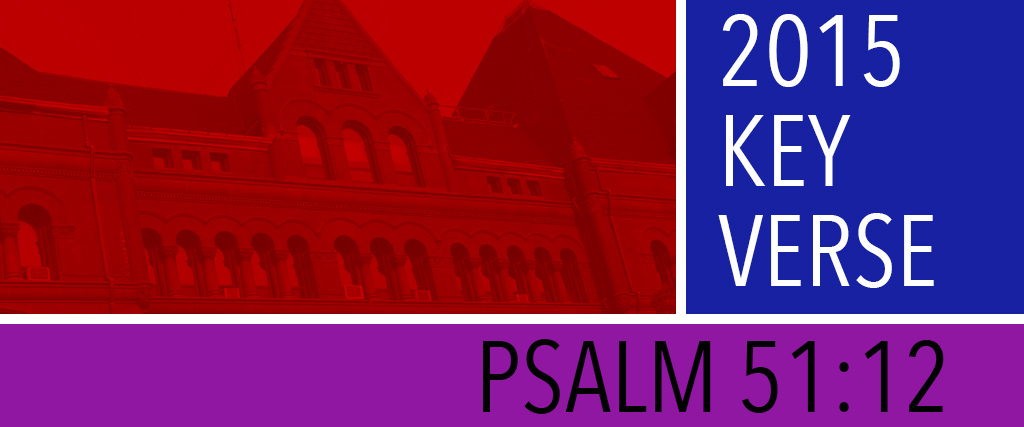Date: Feb. 14, 2016
Matthew 9:1-17
Key Verse: Matthew 9:6
“But I want you to know that the Son of Man has authority on earth to forgive sins.” So he said to the paralyzed man, “Get up, take your mat and go home.”
There have been many famous kings throughout history. In the 5-6th century, there was the legendary King Arthur who is said to have united the British tribes in defeating the Saxon invaders. There was another king by the name of King Richard I - The Lionheart (1189-1199) who gained fame for his chivalry, courage and untiring spirit during the crusades. There was also King Edward I (1272 to 1307) which you may remember from the Braveheart movie. He was an imposing figure who transformed Britain by waging brutal wars of conquest in Wales and Scotland to unite the Kingdom. You may have also heard of the infamous King Henry VIII (1491 – 1547) who split the Church of England from Rome, leading to rise of Protestantism in England and not to mention he had had two of his six wives executed. These were just the ones from England. From this snapshot of history almost all of them used their authority selfishly and for evil. Such was the case pretty much throughout history.
In today’s passage we find a king that is unlike all other kings in history. One who had authority greater than every king that came before and after. And he NEVER used his authority selfishly or for evil. He is Jesus who is called the King of kings and Lord of lords. Let’s take a look at how he used his authority.
This story has been recorded in the Bible by Matthew, Mark and Luke. Each of them have their own view point and record additional details. Let’s start by taking a look at verses 1 & 2. “Jesus stepped into a boat, crossed over and came to his own town. 2 Some men brought to him a paralyzed man, lying on a mat. When Jesus saw their faith, he said to the man, “Take heart, son; your sins are forgiven.”” When we read these verses we see a lot happening but one thing kind of catches our eyes, it says, “Jesus saw their faith.” Usually we think of faith as something internal inside of us, so what does it mean that Jesus see their faith? It’s centered around five guys, no not the fast food chain. You say what five guys, well according to Mark’s gospel, the “some men” here actually refers to four guys who made a decision to help their paralyzed buddy. That’s how I come up with the number five. We don’t know how this man became paralyzed, if it was from birth or an accident, but one thing is clear these four guys cared deeply for their friend. It wasn’t easy for them to get him to Jesus. Mark and Luke reveal that when they found Jesus the house where he was teaching was so jam packed and there was such a large crowd surrounding the house that there was no way they were going to get to see Jesus. It may have been discouraging for them when they finally got him to Jesus they couldn’t get him close enough to be healed. But that didn’t stop them. In those days most people used the roof of their houses like a deck because they were flat and usually they had a staircase on the side of the house to give them access. So these four guys carried this paralytic up those stairs to the roof. Ok now what, they’re on top but Jesus is down inside. According to Mark and Luke’s account these four guys began to tear a hole in the roof so that they could lower him down to Jesus. I know Dan & Viola live in a building that has a flat roof and maybe Monica and Orlando do to. Imagine if you were having a party when all of a sudden some people are digging a hole through your roof. If this happened to you, you’d probably want to stop them but before these homeowners could do anything, these guys lower this paralytic down right in front of Jesus. It’s a good thing they picked the right spot to make a hole otherwise they might have had to swing him over to Jesus which might not have had such a graceful ending.
I imagine that as Jesus was teaching in this house and when the hole started opening up, maybe he stopped and just watched to see what was going to happen. Their act was abrupt and rude, and I imagine illegal. They could have been arrested and charged with criminal trespassing and destruction of property but the passage says that Jesus saw their faith. Jesus saw how they took their belief that he could heal this man and took action. Most people look at others outer appearances and then judge them based on their personal assumptions but Jesus was different. He could see their inner motive and compassionate concern for their friend. Their overcoming spirit and certainty that Jesus would accept and heal this man was amazing. That’s what it means that Jesus saw their faith. Their faith wasn’t only theological, but real and practical. Their faith pleased Jesus and he was willing to bless this man because of them.
Through this we can see the value of good friends. On Friday M. Daniel said if you can make one good sincere friend during your lifetime, then you’ve had a successful life. Here I pray that our ministry may deepen our bonds of friendship with one another. That we wouldn’t have just superficial relationships but be willing to go out of our way, like these four men for one another.
As soon as they set this man down, Jesus says, “Take heart, son; your sins are forgiven.” This was probably the last thing they expected to hear. They brought this man to Jesus with the hope that he would be healed instead Jesus wants to forgive him. They may have thought, “Ok that’s great but what about the bigger problem, Jesus.” But what they failed to realize is that Jesus was dealing with the bigger problem. Jesus reveals what we really need. Sickness and death are the result of sin. Healing only treats the symptoms and doesn’t get to the root of the issue. Forgiveness of sins cures the real problem and that what Jesus wanted to do, to heal him completely not just treat the symptoms. On a side not here I’d like to point out that this is something that is unique to Christianity. Although the Christian faith has many values and virtues, the main point that God ever gave to man is that man, a sinner, can know the fullness of forgiveness for that sin. That is the heart of the message of Christianity, and that is exactly the point of the miracle in this passage.
The question is, how can we solve the sin problem? Many people do good things, hoping they will compensate for their evil deeds. Many religions teach this. Other people deal with this problem by torturing themselves with guilt and condemnation hoping to absolve themselves of their sins. Still others try to forget about their sins by emerging themselves in entertainment: movies, video games, or even work, or meditation, or worse by drinking or drug use. However, these things are temporary and don’t last. We always come back to our sin because we can’t solve it by ourselves. And if you think, “Well that’s not me,” the Bible says, “There is no one righteous, not even one” (Ro 3:10). All of us are sinners and only God can solve our sin problem. How did he do this? In his great mercy, God sent his one and only Son Jesus Christ into this world, not to condemn the world, but to save the world through the forgiveness of sins. Jesus paid the full price for our sins through his death on the cross. On the cross, he prayed, “Father, forgive them, for they do not know what they are doing” (Lk 23:34a). In this way Jesus displayed his authority over sin and declared to the paralyzed man, “Your sins are forgiven.”
However, some of the teachers of the law said to themselves, “This fellow is blaspheming!” (3) In Mark 2:7 they added, “Who can forgive sins but God alone?” In one sense, they are right. Only God can solve our sin problem. Sin is primarily an offense against God, so forgiveness must come from the one we offended, God. Jesus wanted to persuade them that he came from God for the purpose of bringing forgiveness of sins. Take a look at verses 5-6. “Which is easier: to say, ‘Your sins are forgiven,’ or to say, ‘Get up and walk’? 6 But I want you to know that the Son of Man has authority on earth to forgive sins.” So he said to the paralyzed man, “Get up, take your mat and go home.” When Jesus asked them, “Which is easier: to say, ‘Your sins are forgiven,’ or to say, ‘Get up and walk’?” of course both of these are easy for us to say but are impossible for us to do, yet God can do both. Jesus wanted them to know that he is the Son of Man sent by God with authority on earth to forgive sins. Jesus stands in contrast to earthly kings who use their authority for selfish gain or evil purposes but Jesus uses his authority to forgive sins and heal the sick. When the crowd saw this, they were filled with awe; and they praised God, who had given such authority to man (8).
Take a look at verses 9-10. “As Jesus went on from there, he saw a man named Matthew sitting at the tax collector’s booth. “Follow me,” he told him, and Matthew got up and followed him. 10 While Jesus was having dinner at Matthew’s house, many tax collectors and sinners came and ate with him and his disciples.” According to a Jewish historian, tax collectors made up the very bottom layer of Jewish society. They were the most despised people in Israel, lower than even the prostitutes and slaves. One of man’s basic needs is self-esteem and his desire is to honored and recognized by others. But Matthew ignored these things and pursued money as if it was everything. In the process, he lost his self-esteem and people’s respect. He gave up his identity as one of God’s chosen people for the sake of personal gain. He had money, but he could not buy happiness, peace, or righteousness. He found that he lost many valuable things in order to get money. Now it seemed there was no way to remove his past mistakes. His life was ruined, messed up. No one understood him.
Matthew was known as a public sinner because his sin was exposed for all to see and most people condemned him without understanding his pain. But Jesus understood him and invited Matthew to follow him. But the Pharisees scoffed at this and complained. The religious leader were private sinners because they kept it hidden from public view. As I said earlier, we’re all sinners, some are public and some are private. When Jesus overheard the Pharisees complaining he said, “It is not the healthy who need a doctor, but the sick. 13 But go and learn what this means: ‘I desire mercy, not sacrifice.’ For I have not come to call the righteous, but sinners.” When doctors see a patient they separate the person from the disease. They believe that if the disease is dealt with, the person will be healed and become useful. To doctors, it is not the person, but the disease that is the problem. Likewise, Jesus sees sinners like a spiritual doctor. He distinguishes between sin and people and if only the sin can be cured, the person can be healthy and become useful. So Jesus treats sinners with great hope, deep understanding and tender care, like a doctor who wants to heal them.
In verse 13 Jesus quotes the prophet Hosea (6:6), “I desire mercy, not sacrifice.” The Pharisees needed to learn something. They had a lot of knowledge of the scriptures, they worked hard and sacrificed a lot, but they never understood Jesus’s heart. Jesus used his authority to give mercy. Jesus doesn’t use his power to crush sinners who make mistakes, rather, in his great mercy, Jesus understands, bears with, forgives, and restores people, thus giving us new hope to make a new beginning. James 2:13b says, “Mercy triumphs over justice.” No matter what else we may know about Jesus, we must know that he is merciful. Without knowing Jesus’ mercy, we don’t really know him. The purpose of Jesus’ coming was to show God’s mercy to sinners. Mercy should characterize God’s children. We should examine ourselves. After years of serving God sacrificially, have we have become legalistic and judgmental rather than merciful? I hope not.
In the last section, John’s disciples came and asked Jesus, “How is it that we and the Pharisees fast often, but your disciples do not fast?” Here we can see John’s disciples began to equate themselves with the religious leaders. In the beginning they were much different, but this is proof that if we do not constantly check ourselves over time we will become legalistic like the Pharisees. Verses 15-17 tell us, “Jesus answered, “How can the guests of the bridegroom mourn while he is with them? The time will come when the bridegroom will be taken from them; then they will fast. 16 “No one sews a patch of unshrunk cloth on an old garment, for the patch will pull away from the garment, making the tear worse. 17 Neither do people pour new wine into old wineskins. If they do, the skins will burst; the wine will run out and the wineskins will be ruined. No, they pour new wine into new wineskins, and both are preserved.” Usually we fast when there is an urgent need and we are seeking God. We fast to draw nearer to God but Jesus’ disciples have no reason to fast because God is right there, Jesus is with them. The religious leaders wanted to make Jesus’ disciples to follow all their rules and traditions, but Jesus used his authority to set them free.
In this passage we see how Jesus has authority over sin, sickness, and traditions. As we go through the book of Matthew we’ll see how the religious leaders begin to rebel and question Jesus where he gets his authority. However, the Bible tells us that Jesus was given this authority by God. Daniel 7:13-14 tell us, “In my vision at night I looked, and there before me was one like a son of man, coming with the clouds of heaven. He approached the Ancient of Days and was led into his presence. 14 He was given authority, glory and sovereign power; all nations and peoples of every language worshiped him. His dominion is an everlasting dominion that will not pass away, and his kingdom is one that will never be destroyed.” At the end of Matthew’s gospel Jesus finally tells them, “All authority in heaven and on earth has been given to me.” (v28:18) There is no doubt that Jesus has authority, he demonstrates it again and again. The only question is how will he use his authority.
And in this passage we see the answer to that question, he used his authority to forgive sins, heal a man, redeem a sinner, and to set us free from burdensome traditions. Earthly leaders often abuse their authority by knocking others down on the other hand Jesus uses his authority to life people up and to free us to live a new life. Jesus used his authority to heal a paralytic so that he could live a new life, Jesus used his authority to redeem an abandoned sinful man so that he could live a new life. Jesus uses his authority to free us from burdensome rules and traditions, but most of all Jesus uses his authority to free us from sin so that we can live a new life. Isn’t Jesus the kind of king you want to follow?






